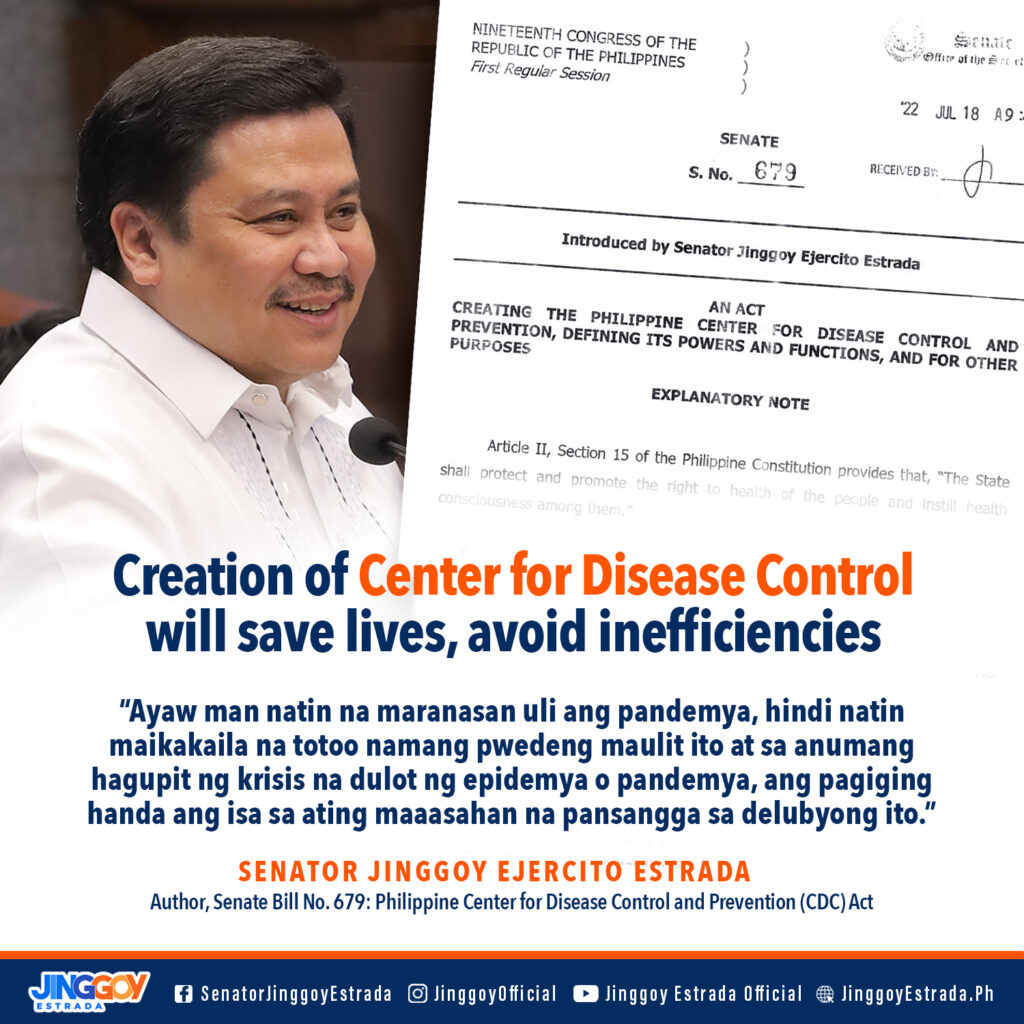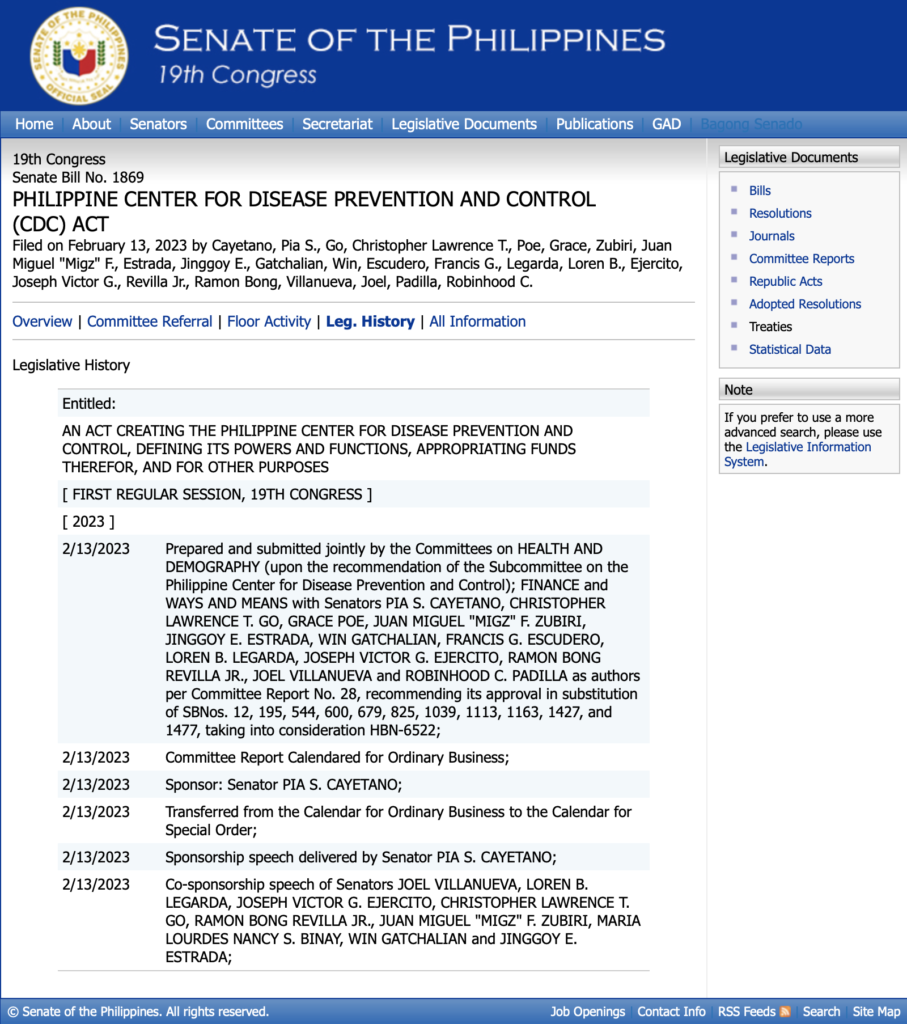COORDINATED efforts of government agencies will facilitate a proactive response to public health emergencies, Senator Jinggoy Ejercito Estrada today said as he underscored the importance of creating the proposed Philippine Center for Disease Control and Prevention (CDC).

“Ayaw man natin na maranasan uli ang pandemya, hindi natin maikakaila na totoo namang pwedeng maulit ito at sa anumang hagupit ng krisis na dulot ng epidemya o pandemya, ang pagiging handa ang isa sa ating maaasahan na pansangga sa delubyong ito,” said Estrada, author of Senate Bill No. 679 or the proposed Philippine Center for Disease Control and Prevention (CDC) Act.
Although nationwide COVID-19 cases continue to drop, particularly in the National Capital Region (NCR), Estrada stressed that communicable and non-communicable diseases have remained serious threats to public health.
“The cure for these diseases and the continuous research on how to prevent them have been the priority of the government along with the synchronization and coordination of efforts of various government entities, which have been proven to be equally important in consideration of our experience from the COVID-19 pandemic,” the seasoned lawmaker pointed out.
Estrada said lessons learned from the COVID-19 pandemic response and crisis management were all considered in the crafting of the proposed measure.
“We intend to establish the Philippine CDC along with the restructuring of certain offices and services to ensure clear delineation of functions and effective coordination with one another to ensure maximum, fast, reliable, and efficient performance, most especially in health crises and emergency response,” the senator said.
Under the proposed measure, several existing offices and units will be restructured, including the Research Institute for Tropical Medicine (RITM) which will be transferred from the Office of the Secretary of Health to the CDC.
Estrada’s SB 679 also proposed the establishment of four centers – Center for Health Statistics, Center for Surveillance and Epidemiology, Center for Health Evidence, and Center for Reference Laboratories – under the supervision and management of the CDC that will lead and coordinate all major functions especially during public health emergencies and disasters.

The bill, which is among the legislative priority measures mentioned by the President in his first State of the Nation Address (SONA), is already scheduled for plenary deliberations in the Senate.
Panukalang Center for Disease Control, makapagliligtas ng buhay, magpapatatag ng healthcare response – Jinggoy
BINIGYANG DIIN ngayon ni Senador Jinggoy Ejercito Estrada na makatutulong sa pagpapahusay ng koordinasyon at patakaran ng mga ahensya ng gobyerno ang panukalang Philippine Center for Disease Control and Prevention (CDC) para sa pagtugon sa mga public health emergency sa bansa.
“Ayaw man natin na maranasan uli ang pandemya, hindi natin maikakaila na totoo namang pwedeng maulit ito at sa anumang hagupit ng krisis na dulot ng epidemya o pandemya, ang pagiging handa ang isa sa ating maaasahan na pansangga sa delubyong ito,” ani Estrada, may-akda ng Senate Bill No. 679 o ang panukalang Philippine Center for Disease Control and Prevention (CDC) Act.
Bagama’t patuloy na bumababa ang mga kaso ng COVID-19 sa bansa, lalo na sa National Capital Region (NCR), iginiit ni Estrada na nananatili pa rin itong seryosong banta sa pampublikong kalusugan.
“Ang mabigyan ng lunas at patuloy na pagsasagawa ng mga pananaliksik para maiwasan ang mga ganitong uri ng sakit ay naging prayoridad ng gobyerno pati na ang paglalatag ng koordinasyon ng iba’t ibang ahensya ay lubhang makabuluhan batay na rin sa naging karanasan natin mula sa COVID-19 pandemic,” sabi pa ng beteranong mambabatas.
Sinabi rin ni Estrada na isinaalang-alang sa pagbalangkas ng nasabing panukalang batas ang mga natutunang aral sa pagtugon sa pandemya at crisis management.
“Sa pagtatatag ng Philippine CDC, layon din natin na isaayos ang ilang mga tanggapan at serbisyo upang matiyak at maging malinaw ang kanilang mga tungkulin at mas maayos ang kanilang koordinasyon. Ito ang magsisiguro ng mabilis, maaasahan, mahusay na emergency response at pagtugon sa mga krisis sa pangkalusugan,” sabi pa ng senador.
Sa ilalim ng panukalang batas, ang ilan sa mga kasalukuyang tanggapan at units ay isasaayos, kabilang ang Research Institute for Tropical Medicine (RITM) na ililipat mula sa Office of the Secretary of Health at ilalagay sa ilalim ng CDC.
Iminumungkahi din ng SB 679 ni Estrada ang pagtatatag ng apat na center – ang Center for Health Statistics, Center for Surveillance and Epidemiology, Center for Health Evidence, and Center for Reference Laboratories – na pangangasiwaan ng CDC na siyang mamumuno at mag-uugnay sa lahat ng pangunahing tungkulin lalo na sa tuwing may public health emergencies at kalamidad.
Ang panukalang batas ay kabilang sa legislative priority measures na binanggit ng Pangulo sa kanyang unang State of the Nation Address (SONA) at nakatakda na itong talakayin sa plenaryo ng Senado.

